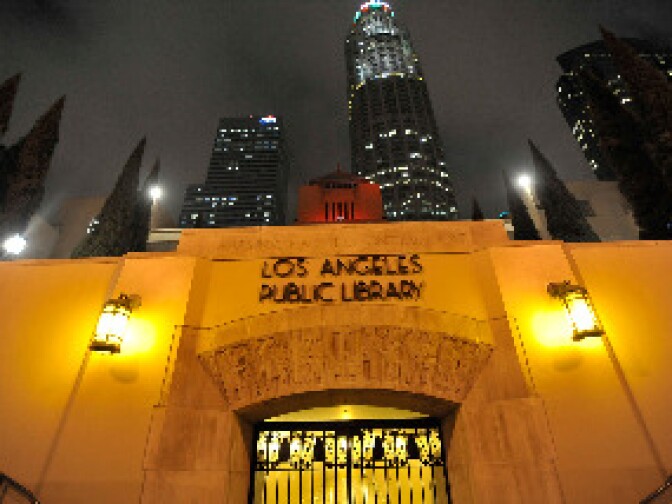This story is free to read because readers choose to support LAist. If you find value in independent local reporting, make a donation to power our newsroom today.
This archival content was originally written for and published on KPCC.org. Keep in mind that links and images may no longer work — and references may be outdated.
LA city ballot measure locks in money for libraries
On March 8, Los Angeles city voters will decide whether to set aside more money for public libraries in the city’s charter. Last year, the mayor and City Council slashed spending on the library system to address a big budget deficit. That forced all 76 locations to close two days a week for the first time. The measure would reverse that, but may require deeper cuts elsewhere in the city.
It’s hard to argue against more money for libraries when you listen to people like Lily Marage. She loves the Central Library downtown.
"It’s my favorite branch because everything goes through, everything," she says excitedly.
At a rally outside City Hall, the 23-year-old recalls growing up in Pennsylvania and moving to a rough neighborhood near downtown LA.
“I read from when I was little because I didn’t want to be like the other kids who hang around and be in gangs and do stuff," she says. "I'd rather read because it opened my mind to the world, people and new ideas.”
Measure L on the March ballot would nearly double the library’s guaranteed portion of property tax revenue, from .0175 percent to .030 percent.
One of the few groups opposed to the measure is the labor union that represents Los Angeles police officers.
“Our opposition is not about ... the importance of libraries," Kristi Sandoval says.
Sandoval, who sits on the board of the Police Protective League, says the union objects to the principle behind the measure: locking up money for libraries amid a big budget deficit.
“Ballot box budgeting basically circumvents the budget process and it circumvents the city council and what they’ve been elected to do.”
The police union exerts a lot of power at City Hall, and the more money the city places out of its reach likely means less for the LAPD, which receives 51 percent of the general fund now.
The union isn't the only opponent.
The Los Angeles Times also urges a “no” vote on Measure L, saying it ties the hands of the City Council and forces deeper cuts to services like street maintenance and parks.
Sitting at his desk inside City Hall, City Council President Eric Garcetti acknowledges that he and his colleagues approved deep cuts to libraries, which reduced staff by a quarter. But they may not have appreciated the magnitude.
“It kind of went under the radar - the impact of the library cuts," he says. " I don’t think we realized until the libraries started shutting down.”
Library managers had warned before the vote that they’d have to cut operating hours. Garcetti says that at the time he’d hoped they could find savings without closing libraries.
Now, the same Council that cut libraries has placed Measure L on the ballot to ask voters to stop it and future Councils from making similar cuts in the future.
Under Measure L, funding would jump from about $76 million to $130 million over four years. Some of the money would pay for maintenance and pensions – costs previously borne by the general fund.
About half the increase in the first few years would go directly to library services, including more open days for branches.
Garcetti says the shift wouldn’t take a big chunk out of the general fund.
“Ya know if you’re looking at this at just a percentage of the LAPD. budget, you’re talking about almost one-tenth of 1 percent.”
Unlike the police union, Chief Charlie Beck is among Measure L’s supporters.
Opponents ask him and others why the city should force more cuts on other departments to bolster the libraries.
Librarians’ Guild President Roy Stone argues that people shouldn’t regard libraries as just another city department.
“We’re the cornerstone of democracy," Stone says. "Without the free public library system, you don’t have that open exchange of information."
He says the Internet is unreliable, it doesn't have old books and often isn't free.
"Librarians say, ‘no if you go on Google, you’re not going to get real information. Let me show you a database that the library provides for you. Let me get you this book.'"
"We're the repository of information," - even in the age of Amazon, Wikipedia and Twitter, Stone says.











